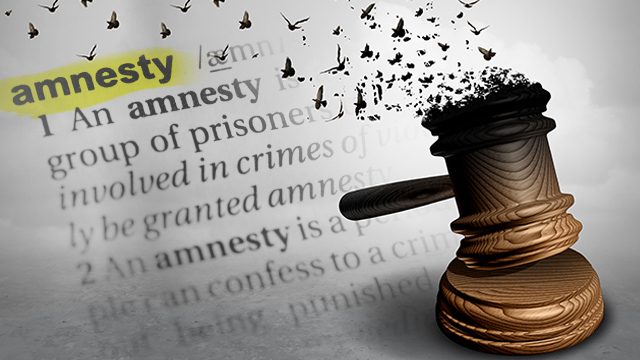SUMMARY
This is AI generated summarization, which may have errors. For context, always refer to the full article.

MANILA, Philippines – The administration of President Rodrigo Duterte announced on Tuesday, September 4, that he was revoking the amnesty granted to Senator Antonio Trillanes IV “effective immediately.”
Trillanes’ amnesty was granted in 2010 by President Benigno Aquino III in connection with the 2003 Oakwood mutiny and the 2007 Manila Peninsula siege.
Here are some fact facts about amnesty.
What is amnesty?
Amnesty is a power granted to the President by the 1987 Constitution.
Under Section 19, Article VII of the Constitution, the President has the power to “grant amnesty with the concurrence of a majority of all the Members of the Congress.” This is on top of related presidential powers such as granting reprieves, commutations, and pardons, and remitting fines and forfeitures, after conviction by final judgment.
The President would sign and issue a proclamation announcing the amnesty. It may also specify the terms of the amnesty, such as its coverage and its effects.
How is amnesty different from pardon?
Supreme Court cases like Barrioquinto vs. Fernandez (1949) and People vs. Casido (1997) distinguished amnesty from pardon.
Amnesty is a public act granted by the President and should have Congress’ concurrence, while pardon is a private act “pleaded and proved by the person pardoned.”
Amnesty may be “granted to classes of persons or communities who may be guilty of political offenses, generally before or after the institution of the criminal prosecution and sometimes after conviction.” Meanwhile, pardon may be granted to a person after conviction.
Amnesty “looks backward and abolishes and puts into oblivion the offense itself” as if no crime has been committed. Pardon, on the other hand, “looks forward and relieves the offender from the consequences of an offense of which he has been convicted” but does not automatically restore one’s political rights (unless restored by the terms of pardon) and does not absolve him or her from paying civil indemnity.
Who qualifies for amnesty? What are the requirements?
The presidential proclamation sets the qualifications and requirements to obtain amnesty.
For instance, soldiers and personnel in the 2003 Oakwood mutiny and the 2007 Manila Peninsula siege – which included Trillanes – as well as those in the 2006 Marines standoff applied for the amnesty granted through Proclamation No. 75 signed in November 2010. A committee in the Department of National Defense (DND) processed all applications.
Proclamation No. 75 made clear that the amnesty “shall not cover rape, acts of torture, crimes against chastity and other crimes committed for personal ends.” Also, their criminal liability in connection with the 3 incidents will be extinguished, but “without prejudice to the grantee’s civil liability for injuries or damages caused to private persons.”
Rules, procedures, and further requirements to implement Proclamation No. 75 were contained in Circular No. 1 of the DND Amnesty Committee.
It included a condition where the applicant should have an “express admission” of participation and guilt, and a “recantation of all previous statements” that are not consistent with the admission.
These were the basis to revoke Trillanes’ amnesty, since he supposedly did not meet these conditions.
How can amnesty be revoked?
The presidential proclamation may specify how an amnesty to an individual may be revoked.
In the case of the amnesty given to communist rebels by President Gloria Macapagal Arroyo in 2007, the illegal possession of firearms by an applicant or amnesty grantee “shall be a ground for denial or revocation of the amnesty, without prejudice to legal prosecution for such illegal possession.”
Proclamation No. 75 does not have a similar provision that explicitly states denial or revocation of amnesty. This was mentioned by Albay 1st District Representative Edcel Lagman in a statement on the revocation of Trillanes’ amnesty.
However, DND Amnesty Committee Circular No. 1 Section 17 says that the department’s final decision is appealable by any party to the application to the Office of the President (OP) within 15 days from notice of the decision.
According to constitutional law professor Dan Gatmaytan, there are no similar cases in which a president has tried to revoke the amnesty of an individual. He likens it to Duterte’s attempt to withdraw from the International Criminal Court in March. (READ: Duterte: PH to withdraw from International Criminal Court ‘immediately’)
“This one should be decided by the courts, because nobody can tell, by the text of the Constitution, if [revoking amnesty] can be done unilaterally by one branch of government,” said Gatmaytan. – Rappler.com
Editor’s note: An earlier version of this story stated that under DND Amnesty Committee Circular No. 1 Section 17, the department’s decision on amnesty is appealable within 10 days from notice. This has been corrected.
Add a comment
How does this make you feel?
There are no comments yet. Add your comment to start the conversation.